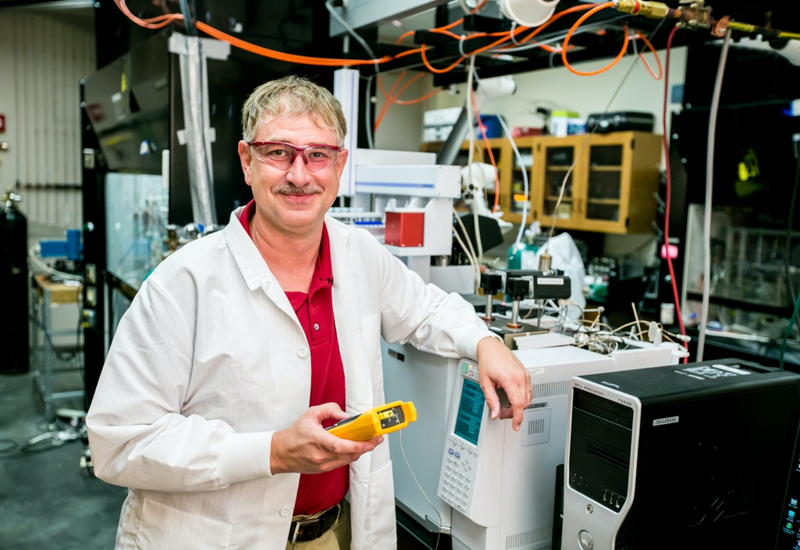Ten years ago, Jochen Lauterbach, PhD, was recruited to the University of South Carolina (UofSC) as the SmartState Endowed Chair in Strategic Approaches to the Generation of Electricity. In this role, Lauterbach went on to build a highly successful research program that actively collaborates with industry, has been involved with launching three startup companies and secured ten patents with another five pending. Now, he has a new role: advocate for SC Innovates, the SmartState Center dedicated to supporting innovative technology and its creators in South Carolina.
Laura B. Cardinal, PhD, is the SmartState Endowed Chair in Innovation + Commercialization and Director of SC Innovates. She recruited Lauterbach to her Center as an advocate because of the need to bridge the gap between scientists and business, both of which share a stake in research and development of new technology. Cardinal teaches a Professional MBA class within the Darla Moore School of Business (DMSB) called Strategic Management of Technology and Innovation.
“Jochen has done an incredible job for the State of South Carolina as a SmartState Endowed Chair. His research lab has attracted national and state industry partners, he’s launched companies, and developed patented technology that can be licensed and commercialized. In addition, he’s taught and mentored engineers who are now innovators with companies around the world. I’m fortunate to have him as an advocate for SC Innovates, but on a much larger scale, a model for what the State of South Carolina can achieve.”
Laura B. Cardinal, SmartState Endowed Chair in Innovation + Commercialization
Lauterbach is an internationally respected and widely published chemical engineer who has developed a cutting edge research portfolio focused on novel technologies to enhance the environmental performance of electricity production. His lab, which includes masters and doctoral level students, provides sustainable solutions to industry-based research problems in a fast-paced environment with high-throughput experimentation for nanomaterials discovery and optimization.
While his research has been supported from federal sources such as DARPA, the U.S. Department of Defense and the U.S. Department of Energy over the last two decades, increasingly it’s industry that fuels his discoveries.

“My research today centers exclusively on renewables and clean energy solutions like the conversion of waste biomass, CO2 conversion and up conversion of waste plastics,” says Lauterbach. “These are hot areas for companies and we have the research and innovation mindset they need.”
While his career is primarily university-based, Lauterbach is very much an innovator. He is committed to instilling his engineering students with a foundational understanding of innovation and the business side of science. For Lauterbach, this knowledge is absolutely essential for today’s engineers.
“Of my PhD students, six went into academia and more than 30 have pursued careers in industry. The skills and knowledge base requirements are different today. Engineers need more than technical skills; they need to understand innovation, how to manage and protect it, licensing, and commercialization.”
Jochen Lauterbach, PhD, SmartState Endowed Chair in Strategic Approaches for the Generation of Electricity
Requirements also vary by career track. “If an engineer joins a large chemical company, they typically go straight to the R&D lab. However, if they join a startup, they will be doing everything from R&D and strategy, to marketing and data analytics.” Lauterbach says. “Plus, industry is competitive so engineers must know how to present and market their ideas in a corporate environment.”
The SmartState linkage between Lauterbach’s Center for Strategic Approaches to the Generation of Electricity and Cardinal’s Center for Innovation + Commercialization is very much strategic and why Lauterbach chose to advocate for SC Innovates. Cardinal’s courses, Strategic Management of Technology and Innovation, are offered within the DMSB’s PMBA program. He would like more engineering students take advantage of her class as an elective or if they decide to pursue an MBA.
“Laura’s class is very valuable for engineering students as it gives them the bigger picture of R&D. Those who understand the business of innovation will progress more quickly in their careers in terms of promotions and opportunities,” Lauterbach says.
“And with opportunities shifting away from government-funded R&D to corporate R&D, engineers with broader strategic knowledge of innovation will be more successful; being out of the lab and engaged in the overall business is key,” he adds.